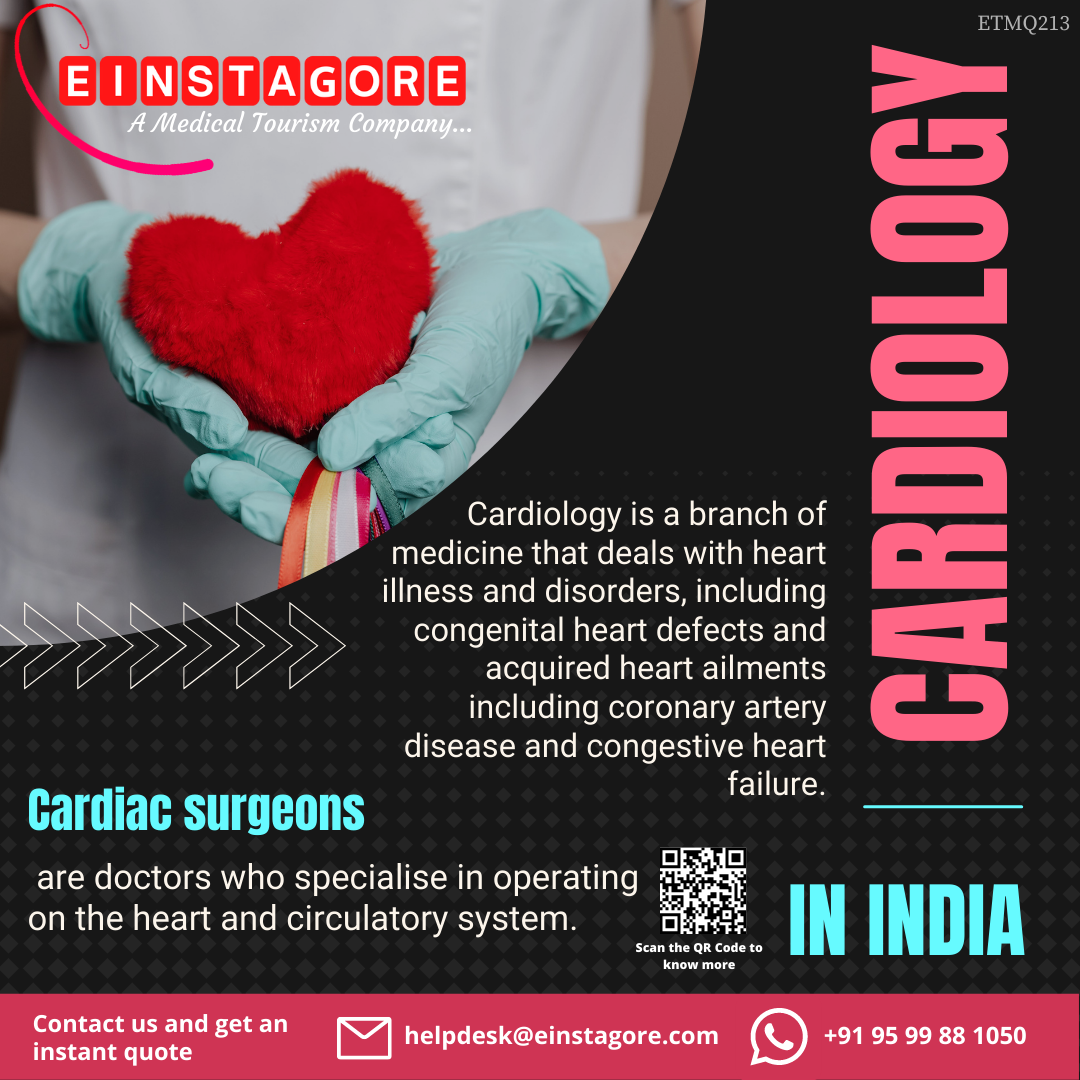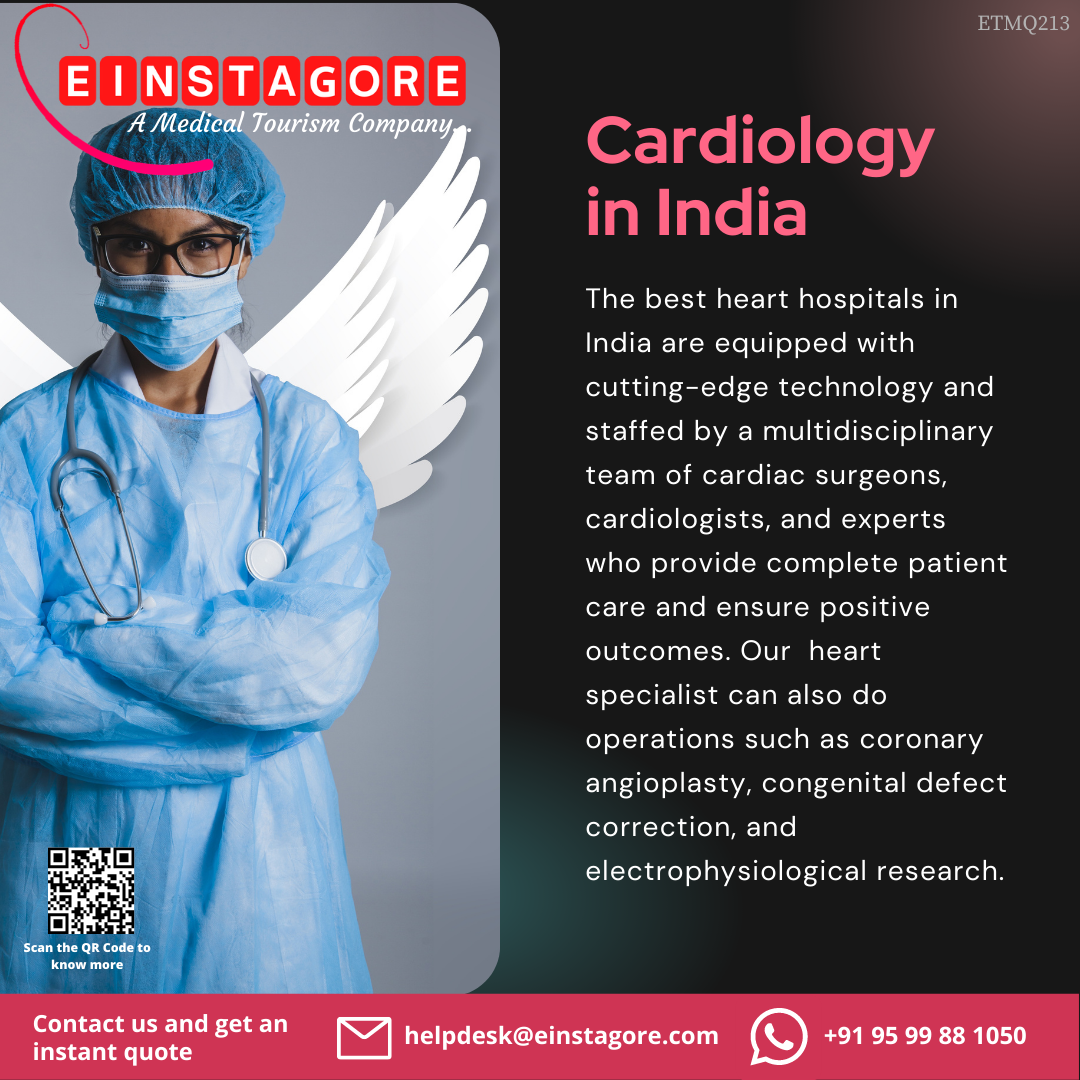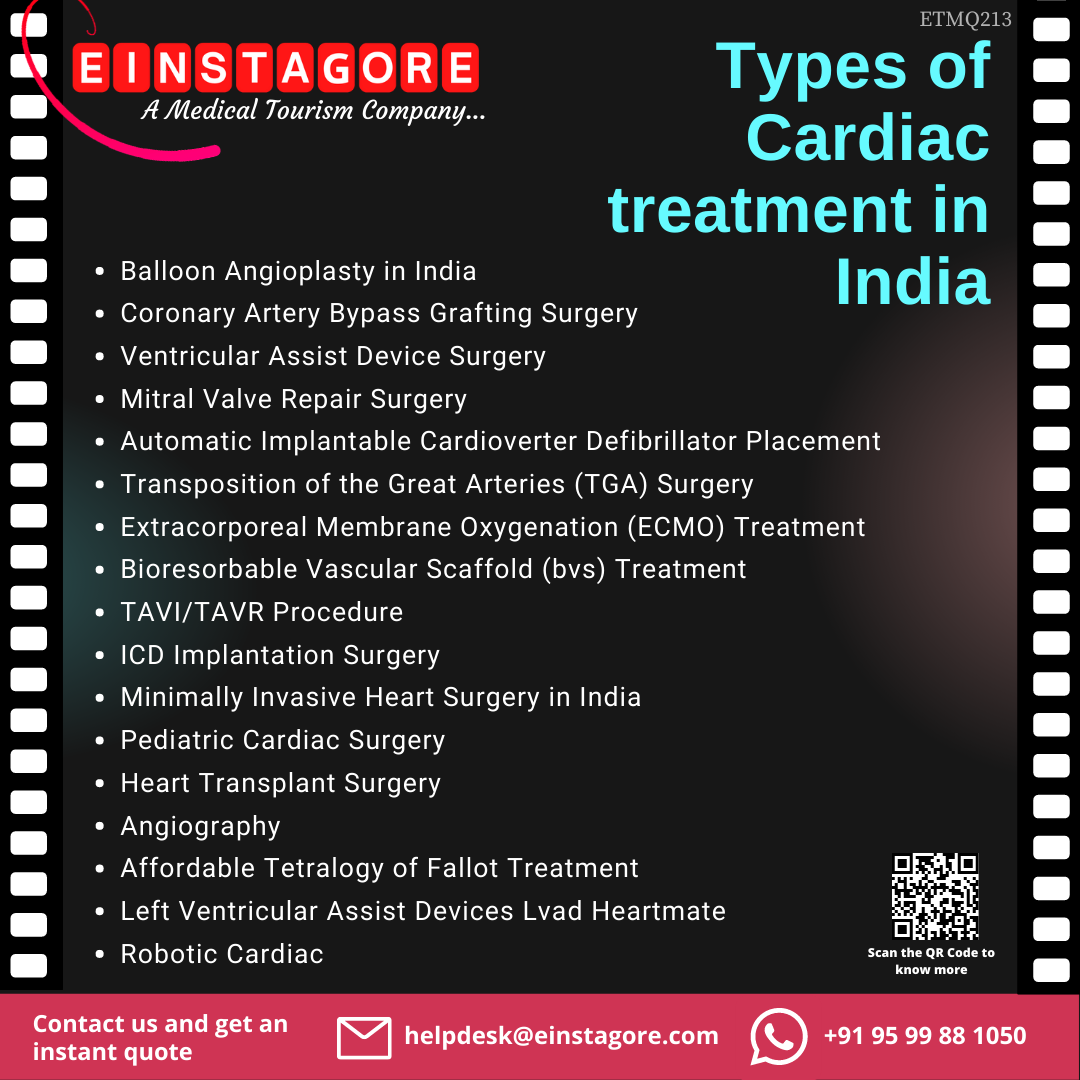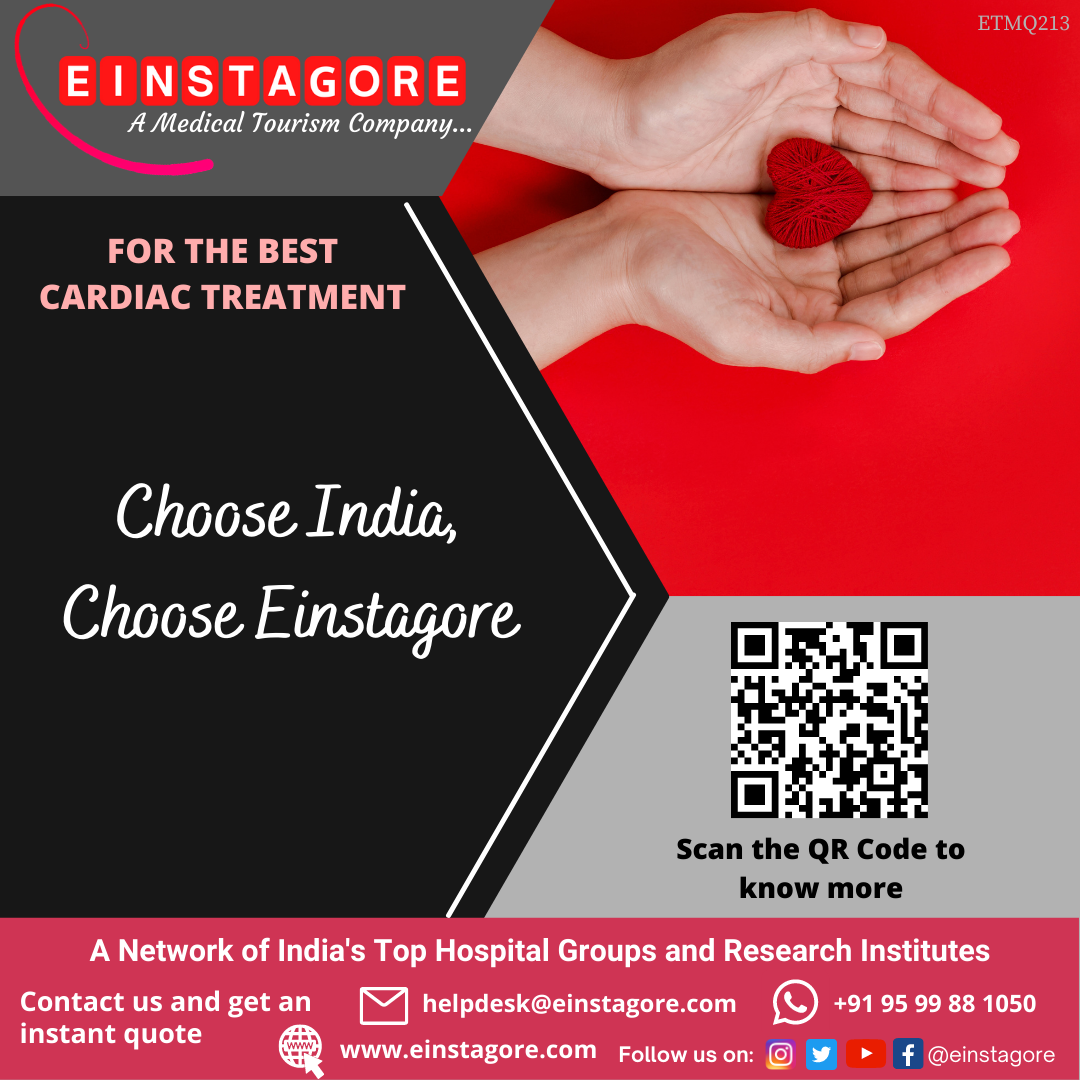Heart Institute
Adult
Cardiology
Non Invasive Cardiology
Interventional Cardiology
Interventional Cardiology is concerned with the catheter-based treatment of heart diseases. Beginning with the detection and treatment of coronary artery disease, vascular disease, and acquired structural heart disease.
Cardiac Pacing and Electrophysiology
An electrophysiological study (EP study) is a test that evaluates the electrical system of the heart and checks for abnormal heart rhythms.


#CountonEinstagore
Lowest Price in India Guaranteed*


Welcome To India !!
Ready to get the best treatment with the best Indian hospitality from Einstagore? Team Einstagore is ready to help you any time! Contact us now!

Adult
Cardiothoracic &
Vascular Surgery
(CTVS)
Cardiothoracic Vascular Surgery Surgeon (CTVS) specialises in accurately diagnosing and treating a wide range of complex and difficult-to-treat cardiothoracic disorders. Our affiliate hospitals performed heart surgery, including mitral valve surgery, cardiac bypasses, and complex aortic and arch surgeries.
Expert Heart Care Treatment for Prevention of Heart Failure
Ventricular Assist Device (VAD)
A ventricular assist device (VAD) is a mechanical pump that is implanted in the heart and used to pump blood from the lower chambers of your heart (the ventricles) to the rest of your body. When this VAD is placed in the left ventricle, it is referred to as a Left Ventricle Assisted Device (LVAD), and when it is placed in the right ventricle, it is referred to as a Right Ventricle Assisted Device (RVAD) (RVAD).
Extracorporeal membrane oxygenation (ECMO)
Extracorporeal membrane oxygenation (ECMO), which artificially carbonates and oxygenates red blood cells, is discontinued for patients who require cardiac and respiratory support due to heart or lung failure.
Minimally Invasive Heart Surgery
The most recent technique for performing heart surgeries is minimally invasive cardiac surgery. In addition, for many heart problems, MICS provides surgeons with greater convenience and effectiveness. rather than cutting through the breastbone as in open-heart surgery, involves making small incisions in your chest to reach the heart. A variety of heart conditions can be treated with minimally invasive heart surgery. In comparison to open-heart surgery, this type of surgery may result in less pain and a faster recovery for many people.
Paediatric
Cardiology
Paediatric and Fetal Cardiology is a branch of medicine concerned with the treatment of heart diseases in children who are still unborn, growing, and developing. Arrhythmias (variations in heartbeat rhythm), congenital heart diseases (present at birth), and circulatory function disturbances are all treated by paediatric cardiologists.

Our friends from around the World can stay assured of getting the Best Affordable Medical Service in India.
Click here to Enquire about your treatment now


Paediatric
Cardiac Surgery
Cardiac surgery in children is recommended to repair heart defects and to ensure the child's long-term health. Certain heart defects may necessitate immediate surgery following birth. In some cases, surgery is performed months or even years after the baby is born. The type and number of surgeries required are determined by the severity of the condition.
Important Terms in
Cardiology
CABG
People with severe coronary heart disease have a coronary artery bypass graft procedure to improve blood flow to the heart. CABG involves connecting or grafting a healthy artery or vein from the body to the blocked coronary artery. In most cases, the surgery improves or completely eliminates angina symptoms. CABG may also reduce your chances of having a heart attack and help you live a longer life.
Angioplasty or PTCA
Angioplasty is a minimally invasive endovascular procedure that is used to open up narrowed or obstructed arteries or veins. Angioplasty can be performed in a variety of ways, including balloon, stent, rotablation, athrectomy, and cutting balloon. Following angioplasty, your doctor will advise you to make changes to your diet and exercise routine.
Angiography
An angiograph is an X-ray test that takes pictures of blood flow in an artery using a special dye and camera. It is done to detect blood vessel problems, to show the pattern of a blood tumour, to look for an ulcer, and so on.
Valve Surgery
The replacement of any of the four valves in the heart, namely the Aortic Valve, Tricuspid Valve, Pulmonary Valve, and Mitral Valve, is referred to as heart valve replacement. The most commonly replaced valves are the aortic and mitral valves. The replacement can be caused by either narrowing or a leaky valve. Mechanical valve, tissue valve, TAVI/TAVR procedure, and Ross Procedure are the surgical options.
Permanent Pacemaker Implantation (PPI)
A pacemaker is a small device that is implanted in the chest or abdomen to assist in the control of abnormal heart rhythms. This device stimulates the heart to beat at a normal rate by using low-energy electrical pulses. Most of our hospitals, use the Micra Transcetheter Pacing System (TPS), which is FDA-approved and is the most advanced pacing technology at one-tenth the size of a traditional pacemaker.
Aorta Repair
Aortic repair is a surgery that is most commonly used to treat aortic aneurysms. An aneurysm is a bulging, weak spot in the aorta that may rupture. The Aorta can be repaired in two ways: open repair or endovascular aneurysm repair (EVAR). EVAR is a type of minimally invasive surgery.
Cardioversion
It is performed on people who have certain types of abnormal heartbeats – arrhythmias – in order to restore a normal heart rhythm. It is accomplished by administering electric shocks to your heart via electrodes placed on your chest. Atrial fibrillation is the most commonly treated arrhythmia.
Carotid Stenting
Carotid stenting is a procedure for opening a narrowed carotid artery. It entails inserting a small, expandable tube known as a stent into the narrowed artery. Because there are two carotid arteries that can be damaged by fatty deposits, your doctor may recommend this procedure.







